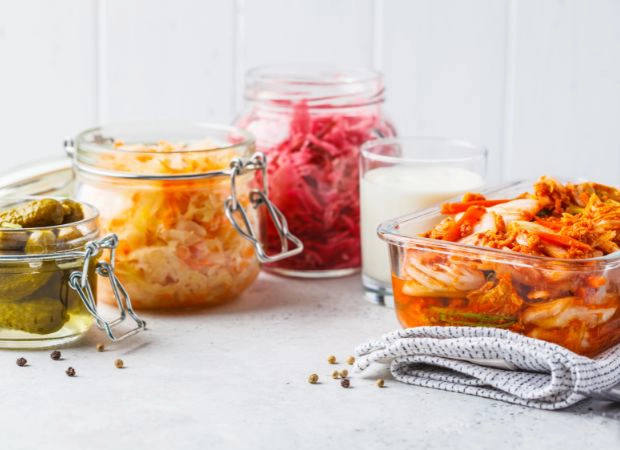People have been fermenting foods for thousands of years, creating everything from beer and wine to bread, cheese, and condiments. Across cultures, fermentation has been a key method for preserving food, adding unique flavours, and even playing a role in religious and cultural traditions.
What is fermentation and why does it matter?
Fermentation is a natural process where microorganisms like yeast and bacteria transform sugars and starches into alcohol or organic acids, thereby preserving food in an anaerobic environment. This process not only preserves food but also enhances flavour and creates delightful tastes and textures.
For home cooks, fermentation is an exciting way to elevate their cooking! It means more flavourful dishes, enhanced nutritional value, and the ability to preserve fresh ingredients for longer periods.
Fermentation vs pickling
While pickling and fermenting are both methods of food preservation, they have distinct processes and produce very different outcomes.
Pickling involves preserving food by immersing it in an acidic solution, typically vinegar-based, resulting in foods that retain their original taste and texture with added tanginess.
Fermentation, on the other hand, relies on natural microbial activity to transform foods, creating complex flavours and textures. These microorganisms typically produce probiotics as a natural byproduct of their metabolic activities. Therefore, fermented foods are often rich sources of probiotics, which can support gut health and overall wellbeing.
8 tips for fermentation
1. Start simple: Begin with easy-to-ferment foods like cabbage (sauerkraut) or cucumbers (pickles) before tackling more complex recipes.
2. Use fresh ingredients: Choose fresh, high-quality produce for the best results.
3. Keep it clean: Ensure all equipment is clean and sanitised to prevent unwanted bacteria from contaminating your ferment.
4. Don’t forget the salt: Salt is crucial for fermentation, as it helps inhibit the growth of harmful bacteria while encouraging the growth of beneficial ones. Use non-iodised salt as iodine can inhibit fermentation. Sea salt or kosher salt creates the best environment to promote fermentation and inhibit spoilage.
5. Submerge fully: Make sure your ingredients are fully submerged in the salty brine to create an anaerobic environment for fermentation. Use a food-safe weight if necessary.
6. Keep it cool: Fermentation generally occurs best at room temperature, so find a spot in your home with consistent temperature for your ferments.
7. Be patient: Fermentation takes time, so allow your ferment to develop its flavours over several days or weeks. You can also taste your ferment regularly to track its progress and adjust seasoning as needed.
8. Trust your senses: If something smells or looks off, trust your instincts and discard the batch.

